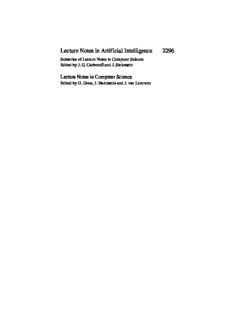
From Theory to Practice in Multi-Agent Systems: Second International Workshop of Central and Eastern Europe on Multi-Agent Systems, CEEMAS 2001 Cracow, Poland, September 26–29, 2001 Revised Papers PDF
Preview From Theory to Practice in Multi-Agent Systems: Second International Workshop of Central and Eastern Europe on Multi-Agent Systems, CEEMAS 2001 Cracow, Poland, September 26–29, 2001 Revised Papers
Lecture Notes in Artificial Intelligence 2296 SubseriesofLectureNotesinComputerScience EditedbyJ.G.CarbonellandJ.Siekmann Lecture Notes in Computer Science EditedbyG.Goos,J.HartmanisandJ.vanLeeuwen 3 Berlin Heidelberg NewYork Barcelona HongKong London Milan Paris Tokyo BarbaraDunin-Ke¸plicz EdwardNawarecki(Eds.) From Theory to Practice in Multi-Agent Systems Second International Workshop of Central and Eastern Europe on Multi-Agent Systems, CEEMAS 2001 Cracow, Poland, September 26-29, 2001 Revised Papers 1 3 SeriesEditors JaimeG.Carbonell,CarnegieMellonUniversity,Pittsburgh,PA,USA Jo¨rgSiekmann,UniversityofSaarland,Saarbru¨cken,Germany VolumeEditors BarbaraDunin-Ke¸plicz WarsawUniversity InstituteofInformatics ul.Banacha2,02-097Warsaw,Poland E-mail:[email protected] EdwardNawarecki UniversityofMiningandMetallurgy DepartmentofComputerScience al.Mickiewicza30,30-059Krakow,Poland E-mail:[email protected] Cataloging-in-PublicationDataappliedfor DieDeutscheBibliothek-CIP-Einheitsaufnahme Fromtheorytopracticeinmulti-agentsystems:revisedpapers/Second InternationalWorkshopofCentralandEasternEuropeonMulti-AgentSystems, CEEMAS2001,Cracow,Polland,September26-29,2001.BarbaraDunin-Keplicz ; EdwardNawarecki(ed.).-Berlin;Heidelberg;NewYork;Barcelona;HongKong; London;Milan;Paris;Tokyo:Springer,2002 (Lecturenotesincomputerscience;Vol.2296:Lecturenotes inartificialintelligence) ISBN3-540-43370-8 CRSubjectClassification(1998):I.2.11,C.2.4,D.2,H.5.3,I.2 ISSN0302-9743 ISBN3-540-43370-8Springer-VerlagBerlinHeidelbergNewYork Thisworkissubjecttocopyright.Allrightsarereserved,whetherthewholeorpartofthematerialis concerned,specificallytherightsoftranslation,reprinting,re-useofillustrations,recitation,broadcasting, reproductiononmicrofilmsorinanyotherway,andstorageindatabanks.Duplicationofthispublication orpartsthereofispermittedonlyundertheprovisionsoftheGermanCopyrightLawofSeptember9,1965, initscurrentversion,andpermissionforusemustalwaysbeobtainedfromSpringer-Verlag.Violationsare liableforprosecutionundertheGermanCopyrightLaw. Springer-VerlagBerlinHeidelbergNewYork amemberofBertelsmannSpringerScience+BusinessMediaGmbH http://www.springer.de ©Springer-VerlagBerlinHeidelberg2002 PrintedinGermany Typesetting:Camera-readybyauthor,dataconversionbyPTP-Berlin,StefanSossna Printedonacid-freepaper SPIN10846424 06/3142 543210 Preface ThisvolumecontainsthepapersselectedforpresentationatCEEMAS2001.Thework- shop was the fourth in a series of international conferences devoted to autonomous agents and multi-agent systems organized in Central-Eastern Europe. Its predecessors wereCEEMAS’99andDAIMAS’97,whichtookplaceinSt.Petersburg,Russia,aswell asDIMAS’95,whichtookplaceinCracow,Poland. Organizersofalltheseeventsmadeeffortstomakethemwide-opentoparticipants from all over the world. This would have been impossible without some help from friendlycentersintheCzechRepublic,England,France,Japan,andTheNetherlands. DIMAS’95featuredpapersfrom15countries,whileCEEMAS’99from18coun- tries.A total of 61 papers were submitted to CEEMAS 2001 from 17 countries. Out of these papers, 31 were selected for regular presentation, while 14 were qualified as posters. Themottoofthemeetingwas“Diversityisthecoreofmulti-agentsystems".This variety of subjects was clearly visible in the CEEMAS 2001 program, addressing the followingmajorareasofmulti-agentsystems: – Organizationsandsocialaspectsofmulti-agentsystems – Agentandmulti-agentsystemarchitectures,models,andformalisms – Communicationlanguages,protocols,andnegotiation – Applicationsofmulti-agentsystems – Agentandmulti-agentdevelopmenttools – TheoreticalfoundationsofDistributedAI – Learninginmulti-agentsystems The richness of workshop subjects was ensured thanks to the CEEMAS 2001 contributing authors as well as the keynote speakers. We would like to thank Jeffrey Bradshaw (University of West Florida, USA), Toru Ishida (Kyoto University, Japan), NickJennings(UniversityofSouthampton,UK),AndrzejSkowron(WarsawUniversity, Poland), and Krzysztof Zielin´ski (University of Mining and Metallurgy, Poland) for presentinginvitedtalksannouncingthemostrecenttrendsinmulti-agenttechnology. SpecialthanksareduetothemembersoftheProgramCommittee,aidedbyauxili- aryreviewers,fortheirprofessionalismandguidanceintheprocessofselectingpapers fortheworkshop. Nothing would have been possible without the initiative and dedication of the OrganizingCommitteeattheUniversityofMiningandMetallurgyandtheJagiellonian University. Finally, we would like to acknowledge the role of the workshop sponsors: the RectorsoftheUniversityofMiningandMetallurgyandtheJagiellonianUniversity,as wellasAgentLink. January2002 BarbaraDunin-Ke˛plicz EdwardNawarecki VI CEEMAS2001 SecondInternationalWorkshopofCentralandEasternEuropeonMulti-AgentSystems, Cracow,Poland,26–29September2001 Undertheauspicesof JMRectorsoftheUniversityofMiningandMetallurgyandJagiellonianUniversity Chairpersons EdwardNawarecki(Poland)chair BarbaraDunin-Ke˛plicz(Poland)programco-chair YvesDemazeau(France)co-chair VladimirGorodetski(Russia)co-chair ProgramCommittee Stanis lawAmbroszkiewicz(Poland) Jean-LucKoning(France) MagnusBoman(Sweden) AbderKoukam(France) Hans-DieterBurkhard(Germany) VladimirMarik(CzechRepublic) CristianoCastelfranchi(Italy) PierreMassotte(France) KrzysztofCetnarowicz(Poland) AntoniMazurkiewicz(Poland) PierreDeschizeaux(France) JohnW.Perram(Denmark) GrzegorzDobrowolski(Poland) LechPolkowski(Poland) AldoDragoni(Italy) JoelQuinqueton(France) LoveEkenberg(Sweden) LeszekRutkowski(Poland) MariuszFlasin´ski(Poland) RobertSchaefer(Poland) AdinaM.Florea(Romania) CarlesSierra(Spain) PiotrGmytrasiewicz(USA) AndrzejSkowron(Poland) AdamGrzech(Poland) AlexanderSmirnov(Russia) GregoryO’Hare(Ireland) VilemSrovnal(CzechRepublic) WiebevanderHoek(TheNetherlands) VadimStefanuk(Russia) ToruIshida(Japan) JozsefVancza(Hungary) NickJennings(UK) RinekeVerbrugge(TheNetherlands) Auxiliaryreviewers MarkusHannebauer(Germany),MarekKisiel-Dorohinicki(Poland), IgorKotenko(Russia),JohanKummeneje(Sweden),XudongLuo(UK), MirjamMinor(Germany),SebastianMu¨ller(Germany),KaySchro¨ter(Germany) Sponsoredby AgentLink, European Commission’s IST-funded Network of Excellence for Agent- BasedComputing Table of Contents InvitedPapers ApproximateReasoningbyAgents A.Skowron.......................................................... 3 NetworkServicesinContextofPervasiveMobileInternet K.Zielin´ski.......................................................... 15 RegularPapers OnBANLogicsforIndustrialSecurityProtocols N.Agray,W.vanderHoek,E.deVink ................................... 29 AConceptofAgentLanguageinAgentspace S.Ambroszkiewicz,T.Nowak,D.Mikulowski,L.Rozwadowski............... 37 Agent’sAdaptivity–SomeAspectsofTheoreticalFoundationsofaNeuralAgent TrainingProcess A.Bielecki .......................................................... 47 Mobie:PersonalizedAutomatedRechargeofPrepaidMobilePhones J.Burgett,S.Hussain,C.M.Jonker,A.Razaq,K.Silz ...................... 54 AFormalSpecificationofM-AgentArchitecture K.Cetnarowicz,P.Gruer,V.Hilaire,A.Koukam........................... 62 Multi-agentSystemforFlexibleManufacturingSystemsManagement K.Cetnarowicz,J.Koz´lak ............................................. 73 MotivationalAttitudesofAgents:OnDesires,Obligations,andNorms F.Dignum,D.Kinny,L.Sonenberg...................................... 83 OnCommitments,Roles,andObligations M.Fasli ............................................................ 93 Automata-BasedMulti-agentModelasaToolforConstructingReal-Time IntelligentControlSystems M.Flasin´ski.........................................................103 Rascal–AResourceManagerforMultiAgentSystemsinSmartSpaces K.Gajos............................................................111 SoftwareDevelopmentKitforMulti-agentSystemsDesignandImplementation V.Gorodetski,O.Karsayev,I.Kotenko,A.Khabalov .......................121 VIII TableofContents FormalSemanticsforBehaviouralSubstitutabilityofAgentComponents: ApplicationtoInteractionProtocols N.Hameurlain.......................................................131 AModellingEnvironmentforMindandMatterAspectsofIntentionalBehaviour C.M.Jonker,J.Treur,W.C.A.Wijngaards.................................141 TemporalLanguagesforSimulationandAnalysisoftheDynamics withinanOrganisation C.M.Jonker,J.Treur,W.C.A.Wijngaards.................................151 SyntacticPatternRecognition-BasedAgentsforReal-TimeExpertSystems J.Jurek.............................................................161 LearningUserPreferencesinMulti-agentSystem A.Kiss,J.Quinqueton ................................................169 TowardsRequirementsAnalysisforAutonomousAgentBehaviour S.W.deLioncourt,M.Luck ............................................179 Messages,Clock,andGravitation A.Mazurkiewicz,D.Wro´blewski........................................187 AnImprovedQ-LearningAlgorithmUsingSyntheticPheromones N.Monekosso,P.Remagnino,A.Szarowicz...............................197 OrganisationsintheParticularClassofMulti-agentSystems E.Nawarecki,M.Kisiel-Dorohinicki,G.Dobrowolski, .....................207 UMLforBehavior-OrientedMulti-agentSimulations C.Oechslein,F.Klu¨gl,R.Herrler,F.Puppe ..............................217 RobotDisassemblyProcessUsingMulti-agentSystem A.Pavliska,V.Srovnal ................................................227 CPlanT:AnAcquaintanceModel-BasedCoalitionFormationMulti-agentSystem M.Pechoucek,V.Marik,J.Barta........................................234 EfficientModelCheckingofCausal-KnowledgeProtocols W.Penczek ..........................................................242 Volcano,aVowels-OrientedMulti-agentPlatform P.-M.Ricordel,Y.Demazeau ...........................................253 ModelofCooperationinMulti-agentSystemswithFuzzyCoalitions J.C.RomeroCorte´s,L.B.Sheremetov....................................263 LearningCollectiveBehaviourfromLocalInteractions N.Sabouret,J.-P.Sansonnet ...........................................273 MASOrientedPatterns S.Sauvage ..........................................................283 TableofContents IX Multi-agentArchitectureforKnowledgeFusionfromDistributedSources A.Smirnov,M.Pashkin,N.Chilov,T.Levashova...........................293 UniversalFormalModelofCollectiveIntelligenceandItsIQMeasure T.Szuba ............................................................303 AProgrammingLanguageforCoordinatingGroupActions W.deVries,F.S.deBoer,K.V.Hindriks,W.vanderHoek,J.-J.C.Meyer.......313 OptimizationofResourceAllocationinDistributedProductionNetworks O.Zaikin,A.Dolgui,P.Korytkowski ....................................322 Utility-BasedRoleExchange X.Zhang,H.Hexmoor ................................................332 AuthorIndex.................................................... 341 Approximate Reasoning by Agents Andrzej Skowron Institute of Mathematics, Warsaw University Banacha 2, 02-097 Warsaw, Poland [email protected] Abstract. Wepresentanapproachtoapproximatereasoningbyagents indistributedenvironmentsbasedoncalculiofinformationgranules.Ap- proximate reasoning schemes are basic schemes of information granule construction. An important property of such schemes is their robust- nesswithrespecttoinputdeviations.Indistributedenvironments,such schemes are extended to rough neural networks that transform infor- mation granules into information granules rather than vectors of real numbers into (vectors of) real numbers. Problems of learning in rough neural networks from experimental data and background knowledge are outlined. 1 Introduction Information granulation belongs to intensively studied topics in soft comput- ing (see, e.g., [28], [29], [30]). One of the recently emerging approaches to deal with information granulation, called granular computing (GC), is based on in- formation granule calculi (see, e.g., [17], [24]). The development of such calculi is important for making progress in many areas like object identification by autonomous systems (see, e.g., [2], [26]), web mining (see, e.g., [6]), spatial rea- soning (see, e.g., [3]) or sensor fusion (see, e.g., [1], [13]). One of the main goals of GC is to achieve computing with words (CWW) (see, e.g., [28], [29], [30]). Any approach to information granulation should make it possible to define complexinformationgranules(e.g.,inspatialandtemporalreasoning,oneshould be able to determine if the situation on the road is safe on the basis of sensor measurements [26] or to classify situations in complex games like soccer [25]). These complex information granules constitute a form of information fusion. Any calculus of complex information granules should make it possible to (i) deal with vagueness of information granules, (ii) develop strategies of induc- ing multi-layered schemes of complex granule construction, (iii) derive robust (stable) information granule construction schemes with respect to deviations of granules from which they are constructed, and (iv) develop adaptive strategies for reconstruction of induced schemes of complex information granule synthe- sis. To deal with vagueness, one can adopt fuzzy set theory [27] or rough set theory [12] either separately or in combination [10]. The second requirement is relatedtotheproblemofunderstandingofreasoningfrommeasurementsrelative to perception (see, e.g., [30]) and to concept approximation learning in layered B.Dunin-Ke˛pliczandE.Nawarecki(Eds.):CEEMAS2001,LNAI2296,pp.3–14,2002. (cid:1)c Springer-VerlagBerlinHeidelberg2002
Description: